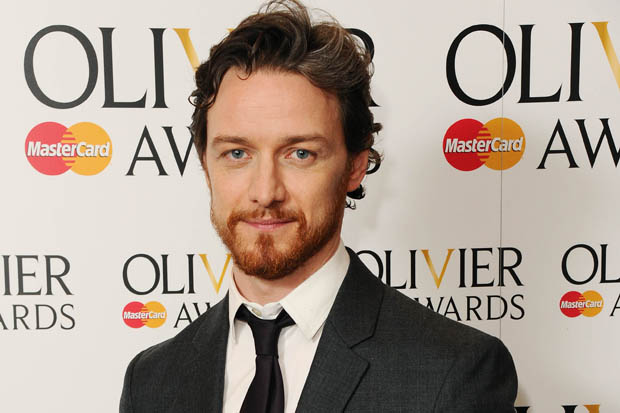The season of cringe-making acceptance speeches at arts awards ceremonies is nearly over, thank heavens. But it hasn’t passed without a most fatuous contribution from James McAvoy as he accepted a nomination for best actor at the Olivier Awards this week. He should have stuck to sobbing and thanking his agent. Instead, he launched a feeble and trite attack on the government for supposedly thwarting social mobility by failing to fund the arts. According to McAvoy’s thesis, ‘Art is one the first things you take away from society if you want to keep [people] down.’
It’s true that several of the British stars in prominent recent films attended private schools — something that McAvoy says doesn’t bother him, even if it has upset shadow arts minister Chris Bryant. But that isn’t for want of drama courses at state schools. Last year, 76,000 students took a GCSE in drama, far more than took Economics (5,400), Latin (10,000), German (60,000) and not all that short of the 97,000 who took IT and the 137,000 who took Physics. Putting drama at the heart of the curriculum, as many schools have done over the past couple of decades, may even be part of the social mobility problem.
Paul Roseby, director of the National Youth Theatre, has asked for drama to be taken off the national curriculum — not because he doesn’t approve of children acting but because he thinks the GCSE is seen as a soft option. Instead, he suggested drama ought to be integrated into other subjects. His intervention predictably raised howls of protest from drama teachers fearing for their jobs — and who equate the school curriculum with the artistic life of the nation. When state schools entice children into taking subjects which have little chance of making them more employable, a great disservice is done. The acting profession simply cannot absorb huge numbers of graduates.
The row ties into a wider debate about schooling and its purpose. Michael Gove was attacked by the arts establishment for trying to return rigour to the curriculum and for showing a preference for subjects which employers find attractive. So it was he, not James McAvoy, who was committed to improving the life chances of poor children. It is depressing that teachers who agreed with Gove felt unable to admit as much in public, as Emily Hill describes on page 30.
McAvoy’s intervention is part of a wider phenomenon of whingeing about the arts. For years, actors and artists have issued warnings about the terrible effect of this government’s cuts but, five years on, Britain’s arts have never been in better health. Last year, for example, the number of visitors to government-sponsored museums rose by two million. Children account for 280,000 of that increase. Austerity has obliged these museums to draw more money from visitors by thinking of better ways to ask for money and other methods. So private donations have grown by 50 per cent. The British Museum has more than doubled the amount it receives in just three years.
The Courtauld, whose Goya exhibition is reviewed by Martin Gayford on page 50, has just opened a new drawings gallery where it can show off some of its 7,000 works by artists such as Dürer, Rembrandt and Michelangelo under specialist conditions.
The Gate Theatre, which Lloyd Evans visited for his review on page 54, is doing a roaring trade — last year it took 73 per cent more at the box office than its target. Individual funders gave 60 per cent more than the previous year.
The arts in Britain are booming — because brilliant men and women in our theatres, museums and art galleries have found ways of making their institutions flourish in an age of austerity.
Subsidising the arts risks stifling them because it puts a small group of patricians in a position of acting as arbiters of taste. They decide what goes ahead, what is promoted and what is rejected. Like any group of people, however hard they try to be fair, they will end up favouring certain types of work. It would be far better for the arts (as well as for artists) if subsidies stopped and the money saved was put towards reducing or even eliminating VAT on tickets. In 2010, the government collected £75 million by taxing London theatre tickets, and spent £100 million on theatre through the Arts Council — so the government is really just sucking money out of the theatre and pumping it into a few favoured areas. Ending this would prick the egos of the artists who see a virtue in unpopularity, but it would help the many theatres and production companies which manage without subsidy.
Like so many areas of government spending, we have ended up with a bizarre mix of taxes on the one hand and subsidies and tax breaks on the other — each of them designed at some point to keep arts lobbyists happy, but leading to an irrational mess. It is time arts funding was rationalised and reduced, with some money perhaps supporting educational activities, but plays, films, music and everything else being left to fight it out in the marketplace.
Got something to add? Join the discussion and comment below.
Get 10 issues for just $10
Subscribe to The Spectator Australia today for the next 10 magazine issues, plus full online access, for just $10.
You might disagree with half of it, but you’ll enjoy reading all of it. Try your first month for free, then just $2 a week for the remainder of your first year.














Comments
Don't miss out
Join the conversation with other Spectator Australia readers. Subscribe to leave a comment.
SUBSCRIBEAlready a subscriber? Log in